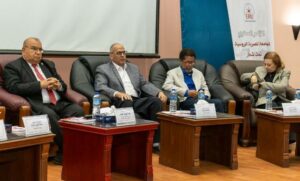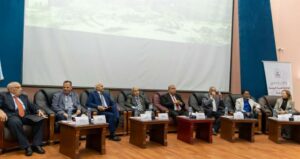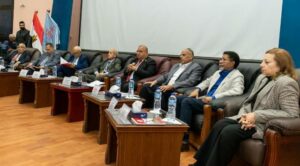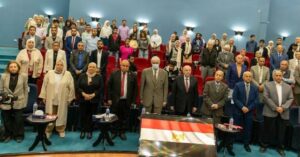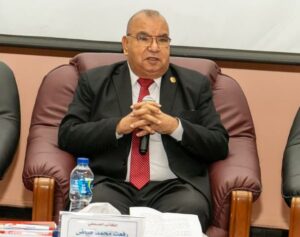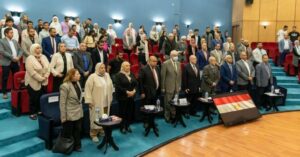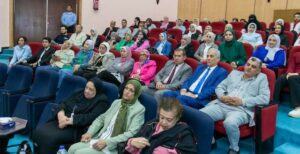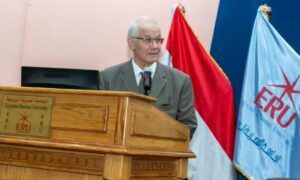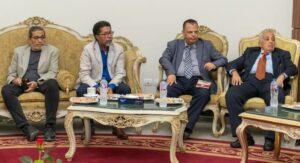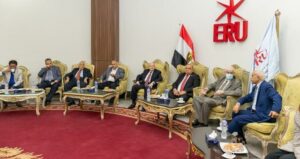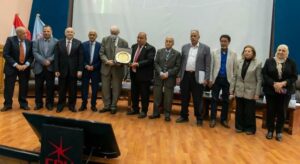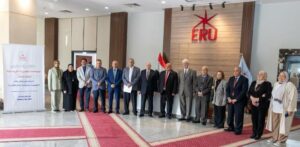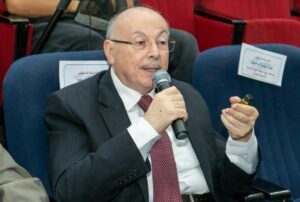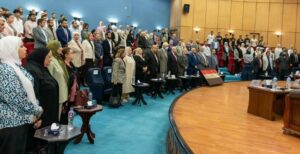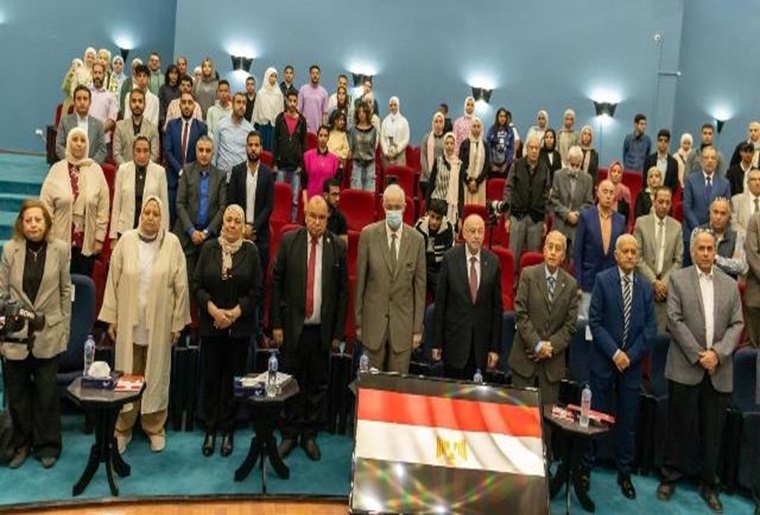The Egyptian Russian University holds annual conference to discuss enhancement of education and scientific research for achieving 2030 vision
Dr. Sherif Fakhry Mohamed Abd-el-Naby, President of the Egyptian Russian University (ERU), announced the organization of the university’s annual conference entitled: “Reviewing the educational, research and innovative outputs,” with the aim to evaluate the progress achieved by the university in the fields of academic education and scientific research at the local, regional and international levels. The conference, in addition, aims at reviewing the university’s plans to achieve its strategic goals and future vision until 2030. Dr. Sherif Fakhry pointed out that the conference was held with the support of Dr. Mohamed Kamal Al-Sayed Mustafa, Chairman of the University’s Board of Trustees, and was attended by Journalist Refaat Fayyad, Managing Editor of Akhbar Al-Youm newspaper and a specialist in educational affairs, in addition to a number of prominent figures in higher education and public figures.
On his part, Journalist / Refaat Fayyad, the principal interlocutor of the conference, paid tribute to the academic programs offered by the university’s faculties, as well as its modern infrastructure and technology, which contribute to improving the quality of the university education, expressing his pleasure by participating in this annual conference. He emphasized the distinguished organization of the conference, which brought together public figures, academics and education experts, and which in turn caused its activities to maximize the use of the expertise of specialists, experts and academics. This enhanced the exchange of ideas and visions to continuously develop education and scientific research.
The ERU’s annual conference achieved great success in shedding light on the developments that the university has witnessed in the recent years, in addition to developing the necessary plans for achieving more progress and innovation in the fields of academic education and scientific research to cope with the goals and vision of Egypt 2030.
Dr. Sherif Fakhry, ERU President, presented during the university’s annual conference the most outstanding points of excellence that make the university a leader in the fields of higher education. He explained that the ERU is the first private university in the Middle East to cooperate with Russian universities through cooperation protocols that allow the exchange of students, in addition to concluding agreements to grant dual degrees with prestigious Russian universities. This allows students to obtain internationally recognized academic qualifications and increases students’ academic opportunities in more than one country. He also talked about the agreements that were signed with Russian universities to create new programs and to benefit from the various experiences and capacities that these universities provide in the fields of different faculties. In addition, he highlighted the academic programs that grant academic degrees from the university, pointing out the programs that have obtained academic accreditation, which reflects the quality of education and training provided by the university.
Dr. Sherif Fakhry also reviewed the achievements accomplished by the university over the past years, whereas more than 50,000 students have graduated since 2010. He shed light on the importance of the distinguished student activities offered by the university, such as the diverse competitions, cultural and sports programs, scientific associations and student activity clubs, which all contribute in developing the students’ personal and leadership skills.
On his part, Dr. Essam Khamis Ibrahim, Advisor to the University President for Academic Development, explained that the conference included a discussion group made up of several specialized sessions, with the participation of deans of university faculties. During these sessions, opinions and ideas were exchanged regarding the discussed topics. He added that this discussion was comprehensive and effective, as it covered different academic fields, which enhances cooperation between academics and researchers and supports innovation in education; which in turn contributes to achieving the university’s future goals. He also indicated that the university has made remarkable leaps with regard to its global ranking in the past four years, which reflects the efforts made to accomplish its future goals.
During the ERU’s annual conference, Dr. Essam Khamis, Advisor to the ERU President for Academic Development, reviewed the distinguished activities of the “Center for Science and Innovation Excellence” at the University. He stated that the center has obtained funds for supporting research projects, and for organizing workshops, training courses and seminars, which enhance the environment for scientific research and innovation within the university. He also tackled the publishing of scientific research, which contributes to enhancing the university’s ranking at the world level.
Dr. Essam Khamis then tackled the activities of the university’s Entrepreneurship Club, whereas he indicated the organization of annual work camps, which aim at coming up with innovative project ideas, in addition to holding entrepreneurship competitions that witnessed great participation from students and resulted in innovative ideas in the fields of marketing, supply chains, and recycling of agricultural wastes. The club also invited a number of public figures, entrepreneurs, and owners of emerging companies to deliver motivational lectures to students and researchers, sharing their own success stories in the field of entrepreneurship.
With regard to scientific research, Dr. Essam presented a panorama of the university’s scientific ranking, stating that a total of 1,150 research papers have been published in internationally indexed scientific journals. He highlighted that the rate of scientific publishing in 2023 increased by 21.5% in comparison to 2022, noting that about half of these research papers were published in prestigious scientific journals that rank in the top 25% in their specializations. He also added that the average citations per research reached 11.4, which is a good indicator of the quality of the presented research papers. He also made it clear that international cooperation in scientific publishing amounted to 41.3% of the total published research. At the conclusion of his presentation, Dr. Essam Khamis announced that the Egyptian Russian University is included in nine international classifications, which reflects its prestigious academic position at the global level.
On her part, Dr. Hana Mohamed Abd-el-Rahman, Advisor to the University President for Student Activities, asserted that the conference witnessed a distinguished presence from faculty members as well as prominent figures of higher education in Egypt, noting that the conference was organized by Ms. / Ekram Mohamed Abd-el-Hamid, the University Secretary General. She added that the conference discussions tackled several main topics, including:
1- Developing academic programs.
2- Research, studies, patents and research projects.
3- Evaluating the academic and administrative performance of the faculties.
4- Cooperation with beneficiary parties, industrial institutions and community service providers.
5- Local and international workshops, conferences and agreements.
A number of deans of the ERU’s faculties also took part in the discussion of the main topics, including: Dr. Ehab Fattouh, Dean of the Faculty of Pharmacy, Dr. Khaled Tawfeeq, Dean of the Faculty of Oral and Dental Medicine, Dr. Alaa Mohamed Al-Batsh, Dean of the Faculty of Engineering, Dr. Hesham Fathy, Dean of the Faculty of Artificial Intelligence, Dr. Mohamed Oraby, Dean of the Faculty of Fine Arts, Dr. Ezz El-Deen Abd-el-Aziz, Dean of the Faculty of Applied Arts, and Dr. Makarem Al-Ghamry, Dean of the Faculty of Al-Alsun and Technical Languages.
At the conclusion of the conference, several important recommendations were reached as important steps towards achieving the goals of the ERU in enhancing its academic and research status, which in turn contribute to achieving Egypt’s 2030 vision. The recommendations run as follows:
1- Updating the curricula to be multidisciplinary and to keep pace with the needs of the 21st century, while focusing on innovation and technology such as artificial intelligence, programming and data analysis, and enhancing self-learning skills.
2- Evaluating the effectiveness of educational programs in accordance with the needs of the labor market through opinion surveys and interviews with students, graduates and employers, while updating the curricula as per the evaluation results.
3- Supporting student innovations by establishing platforms to support student projects and supporting collective projects which bring together students from different specializations by organizing competitions that focus on innovation and project management.
4- Developing entrepreneurial skills by organizing workshops and training courses for developing the students’ entrepreneurial skills, and by hosting entrepreneurs to share their experiences.
5- Enhancing continuing education by offering flexible educational programs which include multiple areas, such as evening or online courses in multiple fields, with accredited certificates to be issued for participants.
6- Encouraging scientific research by providing research grants and supporting cooperation between universities and companies to focus on community issues, such as health, education, and environment, in addition to benefiting from open platforms for research data and information, such as the Egyptian Knowledge Bank, and encouraging multidisciplinary research teams to work together on intersecting issues.
7- Establishing specialized research centers of excellence in fields that are required by the community, while securing the necessary funds and enhancing the necessary partnerships among universities, companies, and non-governmental organizations to exchange knowledge and resources.
8- Supporting partnerships between universities and the private sector by designing training programs together with the private sector, which meet the needs of the labor market and providing practical training opportunities for students.
9- Enhancing the culture of community service by integrating it into academic programs and organizing voluntary initiatives with civil society organizations, in addition to holding workshops and lectures for raising awareness regarding the role of community service in improving life.
https://www.gomhuriaonline.com/Gomhuria/1547093.html
